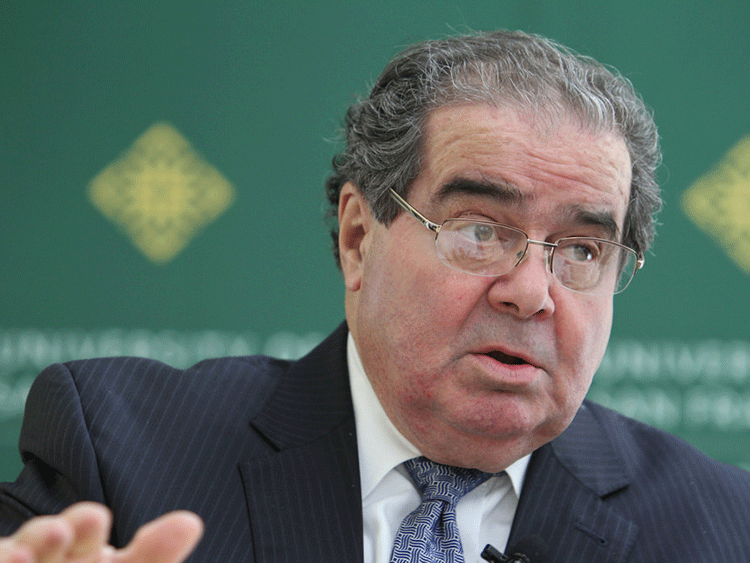News & Opinion
Op-Ed: How To Think About Antonin Scalia

The record of the anti-LGBT associate justice of the United States Supreme Court should not be softened after his death.
February 16 2016 6:27 AM EST
November 04 2024 11:09 AM EST
By continuing to use our site, you agree to our Private Policy and Terms of Use.

The record of the anti-LGBT associate justice of the United States Supreme Court should not be softened after his death.
How should we think about the death of Associate Justice Antonin Scalia? I'll tell you how I'm thinking about it: He's no less a homophobe now that he's dead than he was when he was alive.
After the death of a prominent person, the histories begin--accurate and otherwise--and a hazy gauze can be draped over the life and record of a person. It's certainly happened with President Ronald Reagan, and even to a lesser extent U.S. senator Jesse Helms. As he was a conservative darling, it's bound to happen to Scalia, who will be recast as a champion of personal liberty--when in fact he was a champion of personal liberty for a select few (and specifically, not for LGBTs).
But Scalia, however charming he may have been as a dinner companion, or an opera date for his "best buddy" Ruth Bader Ginsberg, left a dark record on LGBT rights. His words and ideas about our place in America are captured in his dissenting court opinions and in the text of speeches and transcripts of public events.
Whatever happens next in the nominating process to fill the court vacancy left by his death, we owe it to ourselves to remember exactly how he viewed us as LGBT people, and to ensure that his sharp, dangerous edges not be sanded down by eulogies or time.
Scalia pronounced, in his dissent in the landmark Lawrence v. Texas case, the notion that gays, lesbians, and bisexuals are "immoral and destructive" ought to be legally protected: "Many Americans do not want persons who openly engage in homosexual conduct as partners in their business, as scoutmasters for their children, as teachers in their children's schools, or as boarders in their home. They view this as protecting themselves and their families from a lifestyle that they believe to be immoral and destructive." In that same dissent he said laws prohibiting consensual sex by same-sex adults should be thought of as no different from laws that prohibit "prostitution, adult incest, adultery, obscenity, and child pornography."
Moral disapproval again, was at the root of his dissenting opinion in the 1996 Romer v. Evans case. He likened gays and lesbians to murderers, polygamists, animal abusers in that Colorado's "animus" toward those latter groups was justified; likewise "animus" should be acceptable against gays and lesbians: "Of course it is our moral heritage that one should not hate any human being or class of human beings, but I had thought that one could consider certain conduct reprehensible--murder, for example, or polygamy, or cruelty to animals--and could exhibit even 'animus' toward such conduct. Surely that is the only sort of 'animus' at issue here: moral disapproval of homosexual conduct..." Scalia also compared gays and lesbians to addicts and smokers. If the law can demote them to lesser status, it ought to be able to do so to us too--since, it's impossible not to infer--we should be reduced to our conduct. Scalia also omitted the word "respectfully" when writing, "I dissent," at the conclusion of his opinion.
When a Princeton student asked Scalia about that dissent following a speech, Scalia replied, "If we cannot have moral feelings against homosexuality, can we have it against murder? Can we have it against other things? Of course we can. I don't apologize for the things I raised."
His utter disregard for gay couples was perhaps found in one of his most banal insults when in Romer he suggested the bond between the people in a same-sex relationship was no different than roommates. There's no reason the state employee pension be paid to gay spouses, Scalia wrote, "when it does not make such payments to the long time roommate of a nonhomosexual employee."
Scalia is blatantly lying in his Lawrence dissent when he writes: "Let me be clear that I have nothing against homosexuals."
His extreme views weren't limited to screeds against LGBT rights, but such writing is likely why, even as the longest-sitting justice on the current court until his death, he was assigned to write very few majority opinions. He was too toxic even when his side carried the day.
The question now for President Obama is whom to nominate to the vacancy on the court--not whether. The idea that Obama, a constitutional scholar, would consider not doing so is absurd. Even Scalia (if were he able to speak from beyond this mortal coil), the chief herald of the idea of Constitutional originalism, would note that it is the president's constitutional responsibility to nominate a successor, and that it is the Senate's constitutional responsibility to advise and consent. Strict constructionists should abhor the idea of waiting for the next president to make a nomination.
Let's be glad Scalia cannot speak from to us from the next world; his one lifetime of contempt for us was sufficient.
Matthew Breen is editor-in-chief of The Advocate and deputy editor of Out magazine. He tweets at @matbreen.